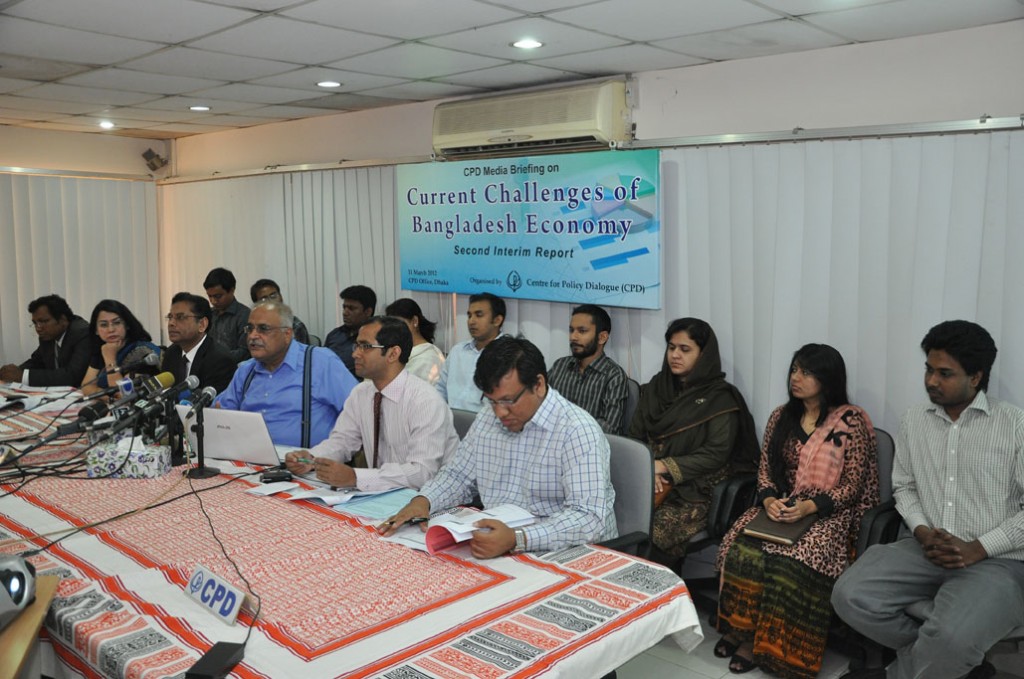CPD released its Analytical Review of Bangladesh’s Macroeconomic Performance in Fiscal Year 2011-12 (Second Reading) to the media at its office on 11 March 2012. The study revealed that, among the South Asian countries, general inflation is the highest in Bangladesh reaching 11.6 per cent in January FY2012, much higher than the government’s target of 7.0 per cent. In fact, while Bangladesh’s inflation rate has risen drastically, its neighbours India, Pakistan, Sri Lanka and Nepal have managed to bring down their inflation rates from 9.48 per cent, 13.9 per cent, 6.2 per cent and 7.5 per cent in January FY2011 to 6.55 per cent, 10.1 per cent, 3.8 per cent and 6.8 per cent respectively in January FY2012.
Among the South Asian countries, general inflation is the highest in Bangladesh reaching 11.6 per cent in January FY2012, much higher than the government’s target of 7.0 per cent
The report cited food and the upward adjustment of administered petroleum and electricity prices, growth in money supply, increased cost of production including wage rate and exchange rate depreciation as major causes of inflation in Bangladesh. While the contribution of food inflation to overall inflation has declined from 75.8 per cent to 64 per cent in FY2012, non-food inflation exceeded food inflation in the first seven months of FY2012 due to a fuel price hike and the domino effect it had on other sectors including transportation and housing. CPD suggested a careful assessment of the extent of exchange rate pass-through into selling prices of imported fuel and food as sellers are blaming higher import costs for the price hike in imported fuel.
The monetary policy stance of the Bangladesh Bank for FY2012 assumed inflation control as its core objective, sacrificing economic growth and investment prospects. CPD’s report states that its present monetary policies supporting the restriction of money supply have been of limited success as they are more suited for demand-pull inflation. CPD’s report also says that this may actually be counter-productive for other natures of inflation. The central bank will have to acknowledge cost-push and structural factors as the main causes of the current incremental inflation and take appropriate measures to combat it.
The report raised concerns over Bangladesh’s public finance, describing it as ‘the weakest link’ in the country’s current economic management. It goes into detail about the rise in public expenditure in the form of subsidies for the Bangladesh Petroleum Corporation (BPC), Power Development Board (PDB) and the agriculture sectors. Along with the unforeseen growth of this subsidy burden, demand for foreign exchange to underwrite liquid fuel import also increased. Mounting demand for resources coupled with a decline in inflow of foreign aid have resulted in high bank borrowing by the government. In addition to that, Bangladesh Bank has further tightened its monetary policy as a part of the conditionalities imposed by the IMF against its loan of USD 1 billion. Both factors will restrict credit flow into the private sector, and will thus impede economic growth, the report added.
On the issue of investment, a number of direct and indirect indicators of investment such as a fall in the growth of industrial term loan disbursements from 34.2 per cent in FY2011 to 2.3 per cent in FY2012 and a decline in primary energy consumption such as gas (gas consumption for captive power generation fell from 1,419 mmcm in 2010 to 1,386 mmcm in 2011) have revealed a very stagnant platform for investment.
The gas and electricity supply in Bangladesh continues to be one of the biggest deterrents for private investment. Energy scarcity, while having the predicted effects on the industrial sector, is also adversely affecting the agriculture sector, particularly crop production. The gas supply between December 2008 and 2011 has marginally increased by an average growth of 7.4 per cent but it has not yet matched the 12.3 per cent increase in demand for gas, leaving a yawning demand-supply gap. Similarly, there was an estimated demand-supply gap of 2,181 MW in electricity during the Boro season. Though a gross total of 3,000 MW electricity has been added to the national grid during the current government’s tenure, it seems to have failed to make a dent on the supply shortfall situation due to faster growing demand.
In light of the overall state of macroeconomic management in Bangladesh, CPD urged the government to take into cognisance that the national economy had entered a difficult period. It advocated a greater transparency in the policy making process, including access to budgetary data and real time information on the performance of the economy along with proper coordination among different government agencies for effective macroeconomic management. CPD also strongly insisted upon parliamentary discussions regarding such matters as well as a participatory environment of political understanding that will facilitate the implementation of development programmes during the current government’s remaining tenure.



